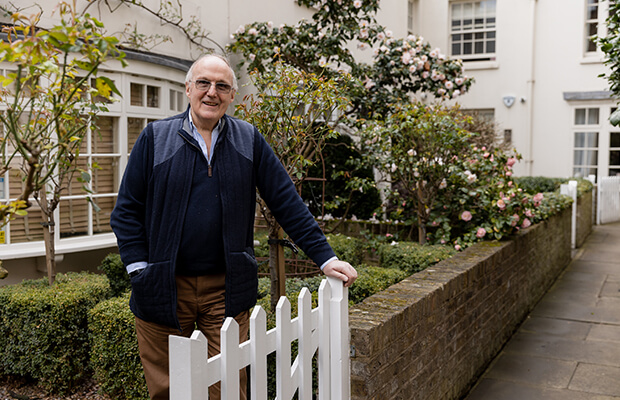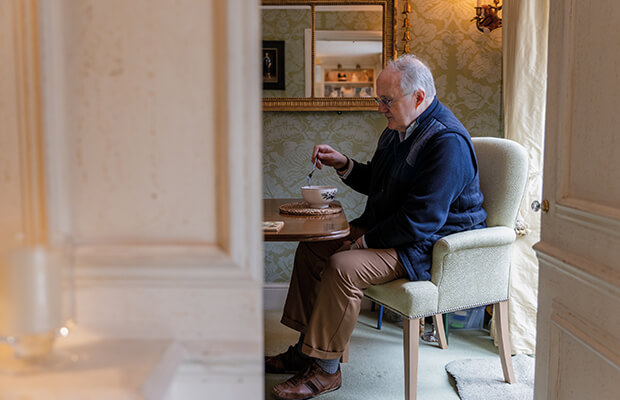If you live alone and have a heart condition you may be worried about juggling work, chores, and staying on top of your symptoms and medication. You may also be concerned about how to get to a medical appointment, who to call when you’re unwell, or what to do in case of an emergency. Here are some tips that can help.
Build a strong relationship with your doctor or nurse
Whether your main point of contact for your health issues is a specialist nurse, a consultant, or a GP, it’s helpful to build a relationship with them. This can feel challenging when services are overstretched but building a rapport will pay off.
Pam Copeland, a heart failure nurse specialist, with experience in community services says: “People who trust their healthcare providers share how they’re feeling. We need this information to help.”
Make your needs known at every step. If you struggle with mobility, your GP may refer you to a physiotherapist or an occupational therapist. If you find that your mood is low, you may be referred to a psychologist. See yourself as at the centre of your own care and be your own advocate.
At first you may worry about wasting your medical team’s time or about coming across as demanding but try not to let that stop you from speaking up.
“I like feisty patients,” says Ms Copeland. “If they’re feisty, they’re in control, which is a really good thing.” Find someone who is approachable, who will listen, and help get you on the right care path.
Become an expert in your own health

Learn what symptoms and signs to look out for, and how to track them. “Call your GP practice or specialist clinic if anything changes or if you’re worried,” says Ms Copeland. If you can’t speak to your GP immediately but are worried and can’t wait, call NHS 111 or visit the NHS 111 online.
If you find it hard to stay on top of medication and appointments, it may be helpful to set reminders on your phone
Helplines, such as the British Heart Foundation Heart Helpline, can also help you make a list of questions to ask in a consultation. They can give you a chance to share your worries with a specialist who will hear your concerns and direct you to the best support and information available. If you find it hard to stay on top of medication and appointments, it may be helpful to set reminders on your phone. You can also use post-it notes on your fridge and pill boxes, if you prefer. Speak to your pharmacist if you feel that a pill organiser box (dosette box) would help.
Some people find apps and wearable devices such as smart watches useful to track things like heart rate, body weight, and daily activity. These devices can also remind you to move more and drink enough water.
It’s important to remember these are not medical devices and so aren’t always completely accurate and reliable. But you could share your device data with your medical team, who can look at the trends and help you understand what’s normal for you. Keep in mind that for some people, these trackers can bring more anxiety than reassurance. Find out what works for you.
Plan ahead

You might worry about what will happen if you’re on your own in a medical emergency. It could be helpful to think about who you’d contact for support. For example, is there someone who lives nearby that could come over if you were waiting for an ambulance? Some smart phones allow you to add emergency contacts, so that your phone automatically texts that contact, after it’s made a call to 999. You may want to consider a personal care alarm, which will alert services if you need help. They can call a family member for you or send help in case of emergency.
If you need to have a procedure, use the pre-op appointment to discuss your circumstances. You may be offered extra support. For example, you may be kept an extra night at the hospital to help ensure you’re safe to go home. The hospital may also help arrange transport or provide some temporary care. You may be connected to a community nurse who will look after your wound dressing and help you with medication in the first few weeks.
Get support from others
You may be surprised how much colleagues or neighbours are willing to help if you are in a health crisis. For example, if you need to be driven to or from hospital and your next-door neighbour has a car, perhaps you could ask for a lift. If you’re working, you could tell a colleague that you’re having a procedure and that you’re worried about managing the recovery on your own. Your employer may also be able to support you.
Hearing from others in a similar situation can help you feel less alone and show you what’s possible for people with your condition.
- Find an an online or local support group where people with heart conditions share knowledge, experiences and practical tips.
Are you living alone?
Were the tips in this article helpful? Do you have other suggestions for those living alone with a heart condition? Email your thoughts for a chance to be featured in the next magazine.
Laurence’s story: “It’s hard when you don’t have anyone to keep you accountable day to day”

Laurence Humphreys-Davies, 69, from London, had two stents fitted after having a heart attack at the gym in March 2014. In the following three years, he had six more procedures, including two open-heart surgeries, and in 2017, he was diagnosed with heart failure.
“It isn’t always easy to look after your health and stay positive when you live alone and far away from family, like I do.
I have four grandchildren; they are the reason I keep active, stick to a relatively healthy diet, and always take my medication. I’ve got pictures of them all over my house. I prioritise them and want to be remembered as a huggable grandpa.
It’s hard to make healthy choices when you live alone and don’t have anyone to keep you accountable day to day. I use apps and wearables to stay on top of my heart rate, weight and blood pressure and I’ve got my health and meds details, and emergency contacts, saved as a lock screen on my phone, so they’re always visible.
I have a wonderful rapport with my cardiac nurse. She taught me about my condition and explained why I need to take each of the six medications that I’ve been prescribed.
People with similar stories who are making it work can help you feel seen, understood and inspired to make it work for yourself too
To anyone in my situation, I’d say, connect with your nurse or GP and ask for a written treatment and rehabilitation plan and have every step explained to you. We all want to know the future. Though no one can tell what will happen, medics usually have a plan and knowing this plan helps you stay focused on recovery.
Another thing I’d strongly suggest is to take care of your mental health. Hearing the words ‘heart condition’ can make your confidence evaporate. Once you get in your head about your diagnosis, it makes everything ten times harder. Connect with others who’ve been through it. People with similar stories who are making it work can help you feel seen, understood and inspired to make it work for yourself, too.”
Get support with your health and wellbeing
Sign up to our fortnightly Heart Matters newsletter to receive tips on coping with difficult emotions, looking after your health and living well. Joining is free and takes two minutes.
I’d like to sign-up
Ways to cope better with difficult feelings
Having a heart condition can change the way you see yourself and the world, says Mina Arvanitopoulou, Lead Clinical Psychologist in Cardiology at Guy’s and St Thomas’ NHS Foundation Trust. But having a heart condition when you live alone, either by choice or because of bereavement, a divorce or breakup, can trigger even more difficult feelings. You may feel lonely and afraid, anxious and angry. You may also experience some shame. You may feel vulnerable and unsafe, “flawed”, lost and without control. You may lose your confidence and independence and think you have less to offer or like you have failed. You may find it very difficult to motivate yourself. These feelings can make you disconnect, but there are ways that may help you cope better.
- Acknowledge that you are going through a very difficult time. It is normal to feel lonely, sad, scared or anxious. This doesn’t mean that you are “broken”, unwanted or unlovable.
- Explore any unhelpful beliefs. Some people believe that life is for the healthy and that we’re a burden when we’re ill. But life is fragile, and all bodies are vulnerable. If you are physically limited, explore how your mind can help you experience love or appreciation. For example, listen to others or read a story to a child.
- Connect with friends and family. Talk about your feelings and try to focus on the needs and feelings of others. Accept the care and love that your family and friends can give you.
- Spend time with peers by joining groups either in-person or online. You can meet new people and build good foundations for friendships.
- Ask for a referral to psychologists within your cardiology service. If this isn’t possible, speak to your GP about your mental health or self-refer to your local talking therapies. You can learn more about finding a therapist at Mind. You can also find a support group through the British Heart Foundation, Arrhythmia Alliance or Cardiomyopathy UK.
What to read next...










